The Crowd She Runs With
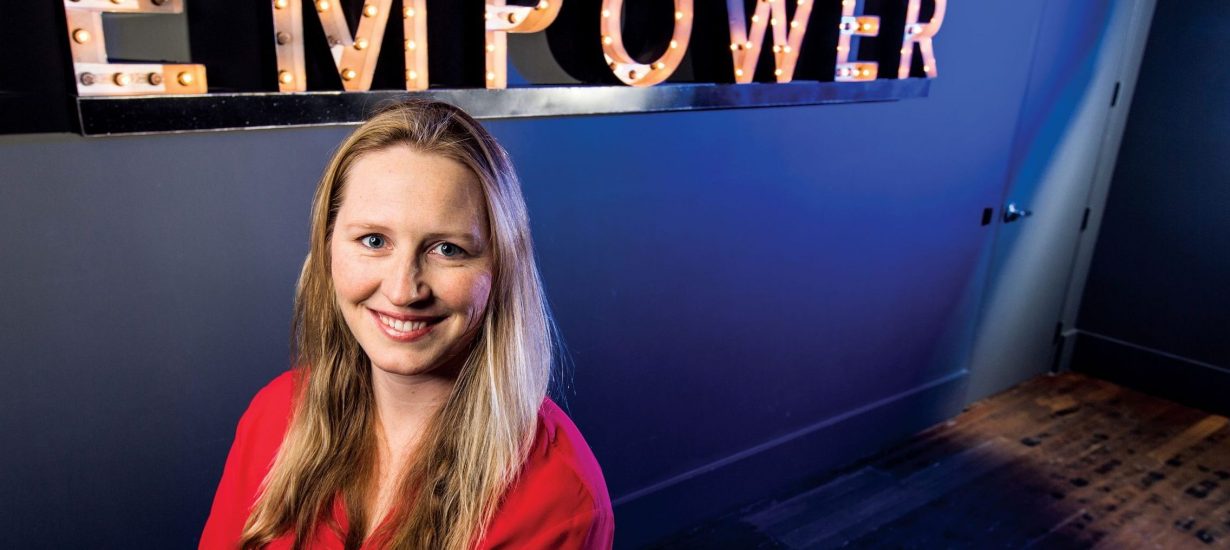
Danae Ringelmann ’00 quickly spotted the roadblocks in traditional finance, and she found a way to give every entrepreneur — and every bright idea — a shot at success.
by Sandra Millers Younger ’75
Danae Ringelmann ’00 grew up watching her parents struggle to keep their family business afloat, bootstrapping all the way, sometimes foregoing their own salaries to keep from laying off valued employees, and even at one point dipping into bankruptcy.
There had to be a better way, she thought, a way for everyday entrepreneurs to enjoy access to financing just as big corporations do.
In 2000, fresh out of Carolina, Ringelmann went to work on Wall Street, hoping to help innovate new financing solutions. But her efforts never found root in the hard soil of an entrenched industry.
So she tried a more direct approach, co-producing a play and staging a preview for a group of potential investors. Great performance, the financiers agreed. But we’re not funding it.
That’s when Ringelmann smacked up against the painful truth: Wall Street had nothing to offer “the little people.” Her idealism crushed, she did the only thing she could think of that might help: She called her mom.
A continent away in San Francisco, Ringelmann’s mother listened to her daughter cry for 15 or 20 minutes before cutting her off. She had a business to run, after all.
“Well, if it bothers you that much, I guess you’d better do something about it,” she said, and hung up.
Danae Ringelmann took that advice to heart. Today, as co-founder and chief development officer at Indiegogo, she leads the world’s first global crowdfunding platform, an 8-year-old company dedicated to democratizing access to funding and bringing to life ideas conceived and supported by everyday people.
“We wanted to turn finance upside down and entrepreneurship inside out,” Ringelmann said. “We wanted to give everyone who had an idea, and was willing to work hard, a shot at success.
“If we could do that, we believed the world would be a lot more fair, more merit based, more democratic and a much better place. Because then the ideas actually happening would be the ones the world actually wants, not the ones a few people in a closed office think or guess the world might want.”
Indiegogo’s success stories include award-winning films, college scholarships, a gluten-free bakery, cat-ear headphones (more on that in a moment) and fertility treatments leading to the world’s first crowdfunded baby.
And Ringelmann and her co-founders, Slava Rubin and Eric Schell, are just getting started.
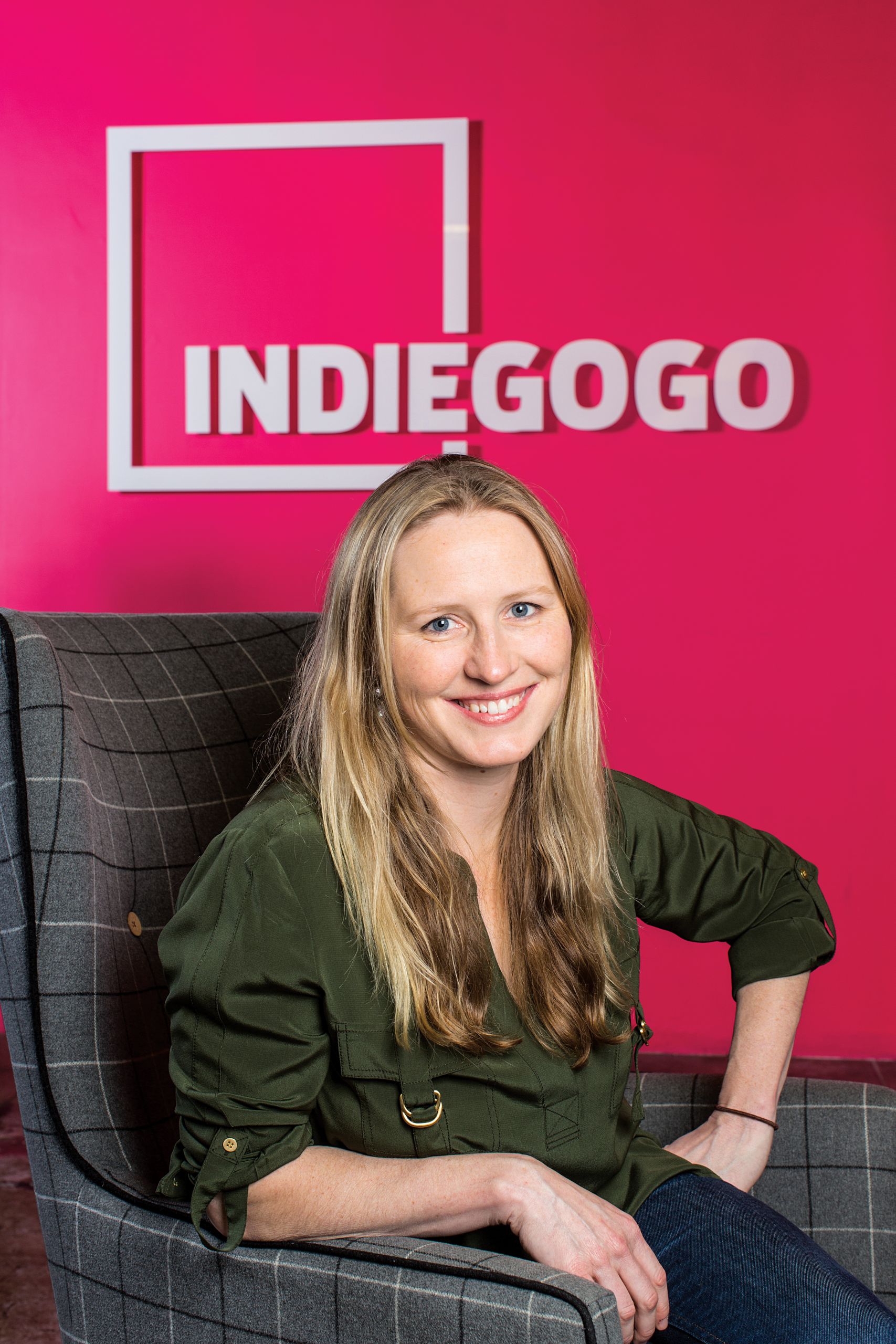
Danae Ringelmann ’00 (Photo by Tomas Ovalle/AP Images for the Review)
Inventing an industry
Since its genesis in January 2008, before crowdfunding was even a word, Indiegogo has pioneered a new industry, enabling more than 600,000 online fundraising campaigns originating in 23 countries and yielding almost $1 billion for entrepreneurs, creatives, philanthropists and people in need.
The concept that emerged after Ringelmann took on her mom’s “be-the-change” challenge has evolved into a movement.
Here’s how it works. Set up a campaign page (at Indiegogo.com) and tell your story — what you’d like to do, why and how much money you’ll need. Offer a range of thank-you gifts or “perks” to reward contributors for various levels of funding.
Use Indiegogo’s marketing tools and global reach to let people know about your campaign and invite them to contribute via the site’s payment interface. After you hit your fundraising goal, take advantage of Indiegogo’s fulfillment tools and online marketplace to sell your product. For certain select projects, Indiegogo may even connect you to manufacturers and retail partners.
The company employs a diverse workforce of more than 100 people, spread across offices in San Francisco, New York, Chicago and Los Angeles. Indiegogo’s paradigm-shifting achievements have drawn industry awards, major media attention and a shout-out from President Barack Obama.
Ringelmann, too, has attracted widespread recognition. She’s been tapped for Fortune magazine’s 40 under 40 ranking, Elle’s Women in Tech Power List and Fast Company’s Top 50 Women Innovators in Technology. She received the GAA’s Distinguished Young Alumni Award in 2015.
Meanwhile, she’s taken the gospel of crowdfunding to a global public as a sought-after speaker at venues around the world, including TEDx, the South by Southwest festival and Capitol Hill.
Like projects it’s nurtured, Indiegogo has proved to be an idea the world was waiting for, a way for anyone, anywhere, to realize otherwise impossible dreams, all in return for a small fee — 5 percent plus payment processing — on funds raised for creative and entrepreneurial projects. Indiegogo’s partner platform, Generosity, supports campaigns for personal and humanitarian needs free of fees.
“People were being left out; ideas were going unborn every day, not for lack of heart or hustle, but because people just weren’t connected to people who had the power and the money to make things happen,” Ringelmann said. “We just thought that was wrong.
“Now, because of Indiegogo, if you’re someone with an idea, you can’t say, ‘I don’t know the right person who will give me money.’ Now the only thing standing in your way is you.”
It doesn’t matter to Ringelmann and her colleagues how offbeat an idea may seem to the general population. Indiegogo is a completely open platform, meaning anyone “contributing in a positive way” can conduct a campaign.
What’s the logic in starting a company to bypass gatekeepers only to become a gatekeeper, they reasoned. And besides, as Ringelmann points out, “Not every idea needs to be a mainstream idea.”
Take those cat-ear headphones, created by two graduate students. Traditional investors scoffed — who would wear them? But Indiegogo contributors responded with a big thumbs-up, raising $3 million. Enter Brookstone, one of Indiegogo’s manufacturing and retail partners, and cat-ear headphones became a holiday best-seller.
A lesson in empowerment
Twenty years ago, when Ringelmann left her family home in San Francisco and came to Chapel Hill as a freshman, she had no idea what she wanted to do in life.
But the world opened up as she pursued her studies, joined the rowing team and took advantage of opportunities available to her as a Morehead Scholar. She traveled to England and spent a summer teaching in the Bronx.
She still remembers a lesson from one of her inner-city students that resonates in her current work.
“This one student was constantly disrupting the class, so I pulled him aside and said, ‘You are so smart, and you’re getting in the way of yourself learning.’ And the next day he was super amazing, and after class he pulled me over and said, ‘How was my conduct?’
“I realized then if you focus on strengths and potential and stop trying to fix the bad stuff, you can bring people forward in ways you can’t even imagine. They do the work. You’re just there to say, ‘Hey, I know you can do it.’ And that’s so much of what I do here at Indiegogo.”
After Ringelmann graduated with a bachelor’s in American studies, she began a career in corporate finance that took her to J.P. Morgan in New York and then Cowen & Co. in San Francisco. By the time she decided to leave the disappointments of traditional finance behind and pursue an MBA at Berkeley, she had formulated an initial crowdfunding concept.
Grad school became a laboratory; her classmates, a pool of enthusiastic supporters and potential co-founders; and every class project, another experiment designed to test and refine her idea.
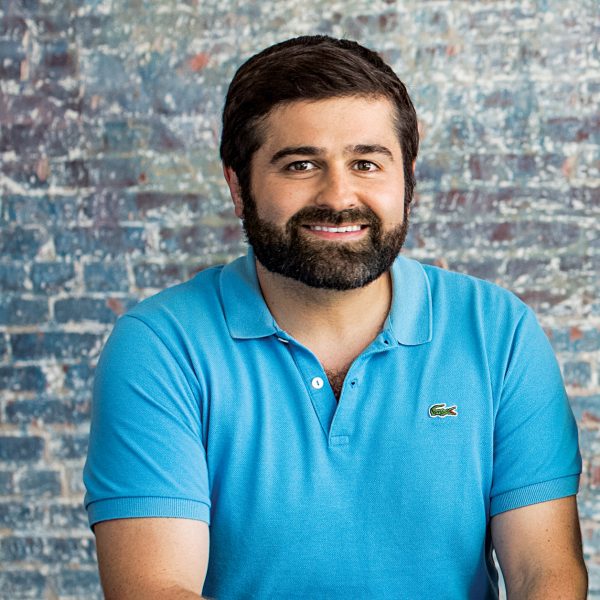
Slava Rubin (Photo courtesy of Indiegogo)
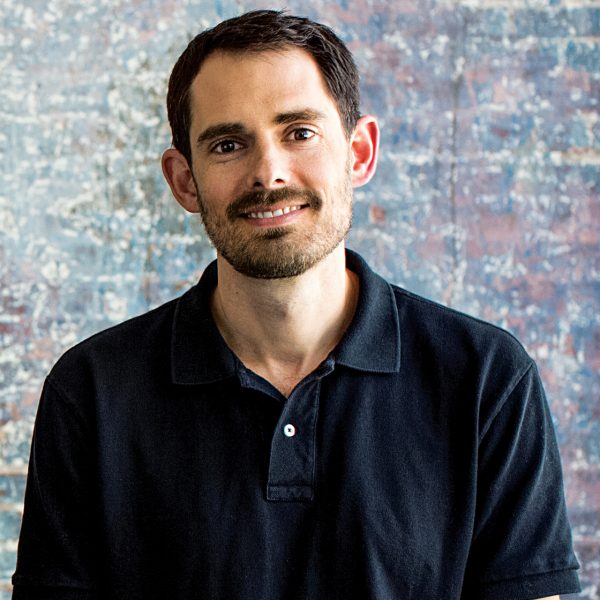
Eric Schell (Photo courtesy of Indiegogo)
When a panel of venture capitalists responded positively to her student work, Ringelmann called the two people who had come to share her vision — classmate Eric Schell and Wharton School graduate Slava Rubin.
“Let’s really do this,” she said. “Let’s figure this out.”
After Indiegogo’s 2008 launch, it took the co-founders three years of pitching the old-fashioned way to secure a first round of investor funding to scale up their startup. In the interim, Ringelmann moved back in with her mom and pinched every penny.
Weathering those tough early years together, the three visionaries forged a working relationship rooted in their complementary strengths and a set of shared motivators that became Indiegogo’s core values:
■ Fearlessness. “When we started Indiegogo, we had to believe it was going to be massive or else we knew we wouldn’t have a chance of being successful,” especially going up against an established industry with pockets deeper than the Grand Canyon.
■ Authenticity. “We wanted to bring our whole selves to work. We didn’t want to have to wear uniforms, either physical or metaphorical.”
■ Empowerment. “The only things that should stand between you and success are a true audience and your willingness to work hard. We’ll help you with the rest.” (Indiegogo also offers a concept-to-market suite of entrepreneurial tools and training.)
■ Collaboration: “Building and changing things together is more fun than building and changing things alone. And the data show that Indiegogo campaigns run by one person don’t do as well as campaigns run by teams.”
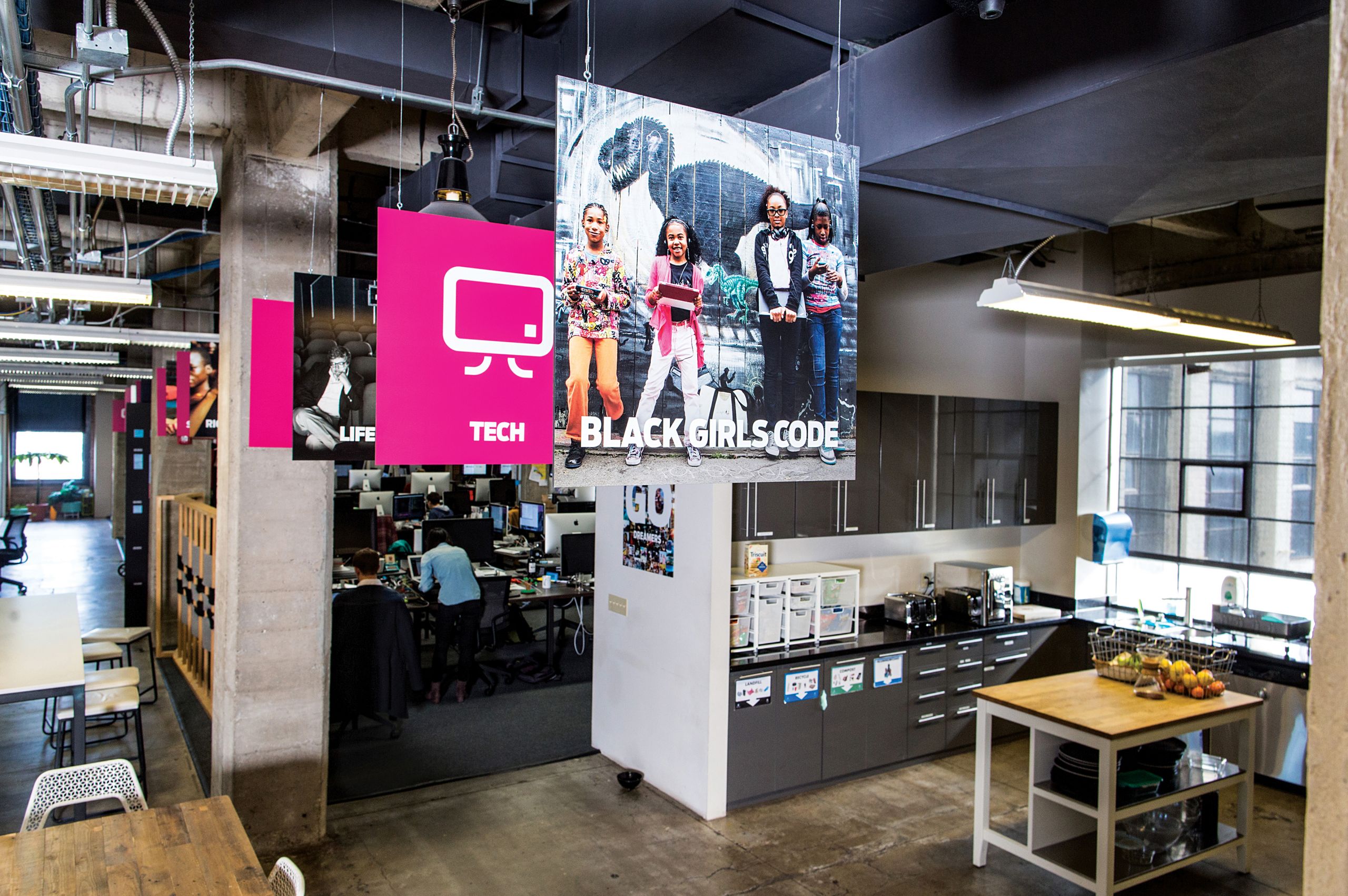
While helping pioneer an industry, Ringelmann and her team also seek to remove traditional barriers within their business. “When you eliminate the gatekeeper judging systems and give the power to the people, you create a system where merit rises to the top.” (Photo by Tomas Ovalle/AP Images for the Review)
These four underlying principles apply equally to Indiegogo employees and customers, Ringelmann says. Take diversity, for instance.
While the technology sector in general and Silicon Valley in particular have drawn fire for a mostly white, male demographic, Indiegogo has cultivated and celebrated differences as strengths.
“Diversity hasn’t been a thing we’re trying to achieve to satisfy an external quota,” Ringelmann said. “It’s been a catalyst for our growth and success.”
And as for the company’s customer base: “We are serving the entire world, all kinds of people of all ages. There’s an entrepreneur inside all of us. It’s just a matter of when you want to act on that. Our vision is to unleash that independent spirit, to bring out that entrepreneur.”
Countering early resistance
Early on, naysayers questioned the very premise of crowdfunding. Why, they asked, would anyone help fund a business venture without the possibility of a return on their investment?
The Indiegogo team discovered that motivation to contribute goes well beyond ROI. Funders also relish the chance to support others, to make an impact, to participate in a larger cause and to score those enticing perks, contributor thank-you gifts.
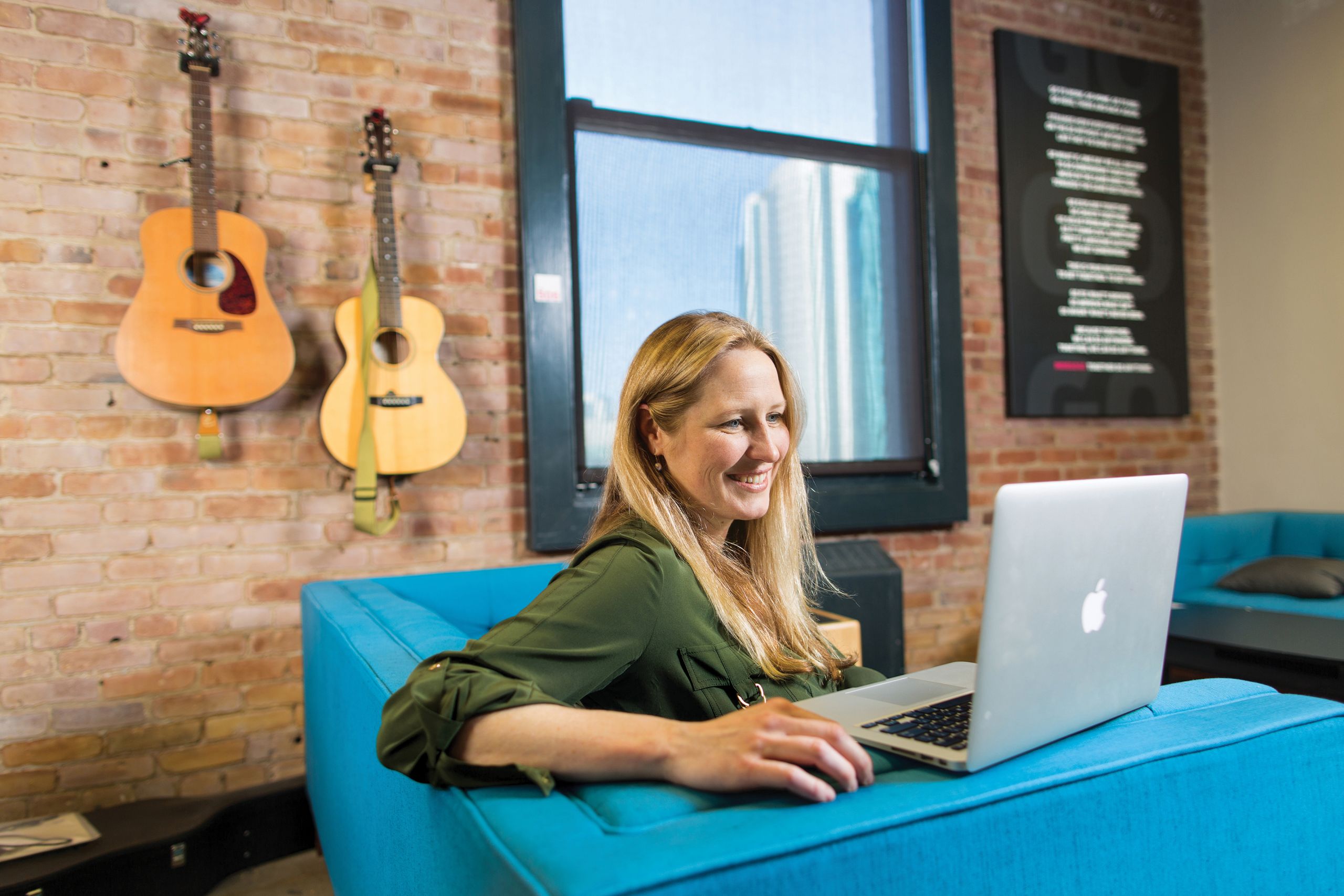
“We are serving the entire world, all kinds of people of all ages. There’s an entrepreneur inside all of us. It’s just a matter of when you want to act on that. Our vision is to unleash that independent spirit, to bring out that entrepreneur.” (Photo by Tomas Ovalle/AP Images for the Review)
If you’re thinking this all sounds like a public radio fund drive, you’re not alone. “We sit in this weird space between philanthropy and commerce,” Ringelmann said, “because we bring out totally altruistic motivations as well as self-serving motivations.”
Another key differentiator of crowdfunding is the experimental nature of products offered as perks during campaigns. Ringelmann and her colleagues are working to educate the public not to expect perfect results from these works in progress.
“If we don’t do a good job of educating people about what they’re actually doing when they fund something, they might think they’re just buying a product. So when estimated shipping dates are delayed, they’ll be upset.”
Traditional financiers, on the other hand, don’t expect immediate perfection.
“If you ask any sophisticated investor how many times projects go exactly as expected, they’re like, well, never. So we’re just exposing what’s always been happening. We’re bringing transparency to entrepreneurship.”
The more that crowdfunding contributors understand the process, she believes, the more powerful the entire movement will become.
“Before Indiegogo, most people were locked out of the funding experience; therefore, they don’t even know they can participate in making something happen.”
The Hollywood formula
Ringelmann points to Hollywood, which elevates only about 300 of the thousands of films made each year to big-screen status.
“Those 300 probably have to satisfy a formula that ensures the optimal chance of reaching and serving as many people as possible,” she said. “But that means stories that don’t necessarily need to reach a bajillion people aren’t getting told. It also means that you as a customer have to wait and hope Hollywood will bring you a film you want to see.”
And speaking of diversity, in a year when the pale lineup of Academy Awards nominees prompted boycotts and an #OscarsSoWhite social media hashtag, half of 11 Indiegogo-funded films screened at this year’s Sundance and Slamdance film festivals were made by women or people of color. That thrills Ringelmann.
“If anything speaks to the power of democratizing access to funding and entrepreneurship, that’s it. When you eliminate the gatekeeper judging systems and give the power to the people, you create a system where merit rises to the top, and a lot of diversity issues go away.”
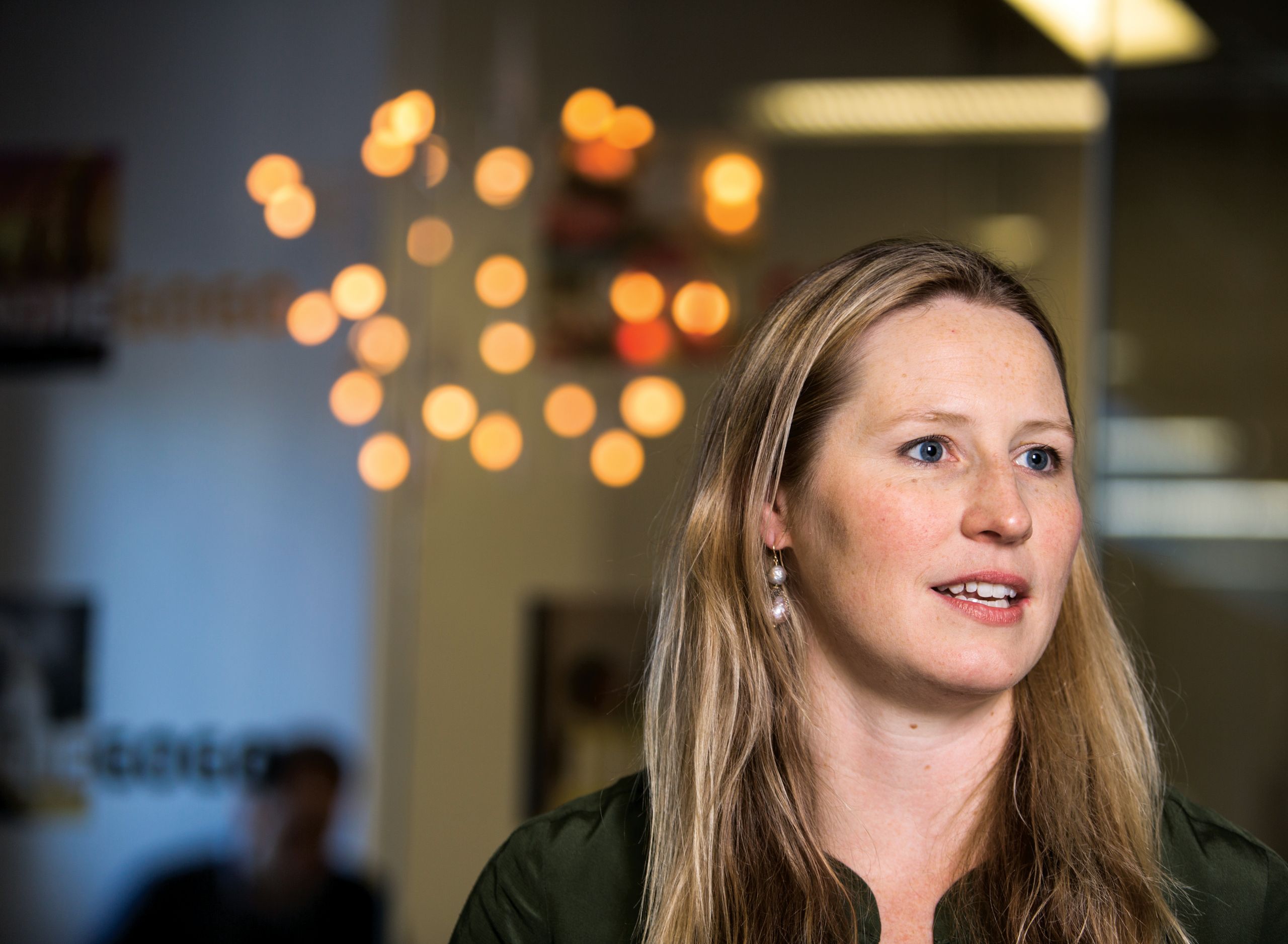
“If you ask any sophisticated investor how many times projects go exactly as expected, they’re like, well, never. So we’re just exposing what’s always been happening. We’re bringing transparency to entrepreneurship.” (Photo by Tomas Ovalle/AP Images for the Review)
A lot of financial risk goes away, too, as many established companies are figuring out. Even giants like GE and Hasbro are now using Indiegogo as a low-risk, time-saving way to test ideas and bring winning products to market.
“Before, if you had an idea, you’d have to convince traditional financiers, who may or may not be your customer, that your idea is good,” Ringelmann said. “It’s an inefficient and super-high-risk approach, because what you’re asking them to do is basically know the future and gamble on the future.
“Now you can just go to the future. Go to your potential customers and let them decide if they want your idea. There’s no better indication of whether a market exists than letting the market exist.”
Helping old-fashioned commerce shift to a new R&D paradigm is one way Indiegogo plans to expand. Also on the horizon: equity crowdfunding and more partnerships with retailers and manufacturers.
Long term, Ringelmann sees even broader possibilities, including, perhaps, a fix for political dysfunction.
“We hire politicians to help represent our interests, because in the old world that’s the only model we had. In our future, people will probably be more civically connected, because they’ll be influencing where money goes in a much more direct way.
“I don’t think it’s going to happen tomorrow, but as we evolve this industry, we’re going to eventually touch every single area across the world where capital allocation decisions are made, including governments. That’s our goal long term. We’re all going to be on the same team again.”
Ask Ringelmann what’s been most meaningful to her so far in her quest to disrupt the traditional finance industry, and she glosses right over the growth charts, the accolades, the global reach.
She describes instead a chance encounter with a random guy at South by Southwest who saw the Indiegogo logo on a shoulder bag she was carrying and pushed through a huge, noisy crowd to speak with her.
“Indiegogo changed my life,” he told her. “Because of you, I launched the business of my dreams.”
Ringelmann’s fondest hope is that more people will follow suit and unleash the entrepreneur inside of them.
Sandra Millers Younger ’75 is a speaker, author and resilience coach based in Lakeside, Calif.
Indiegogo at the Movies
Eleven films featured at the 2016 Sundance and Slamdance film festivals raised development money through Indiegogo — three at Sundance and eight at Slamdance, described as Sundance’s “edgier younger sibling,” also held in Park City, Utah, and at the same time.
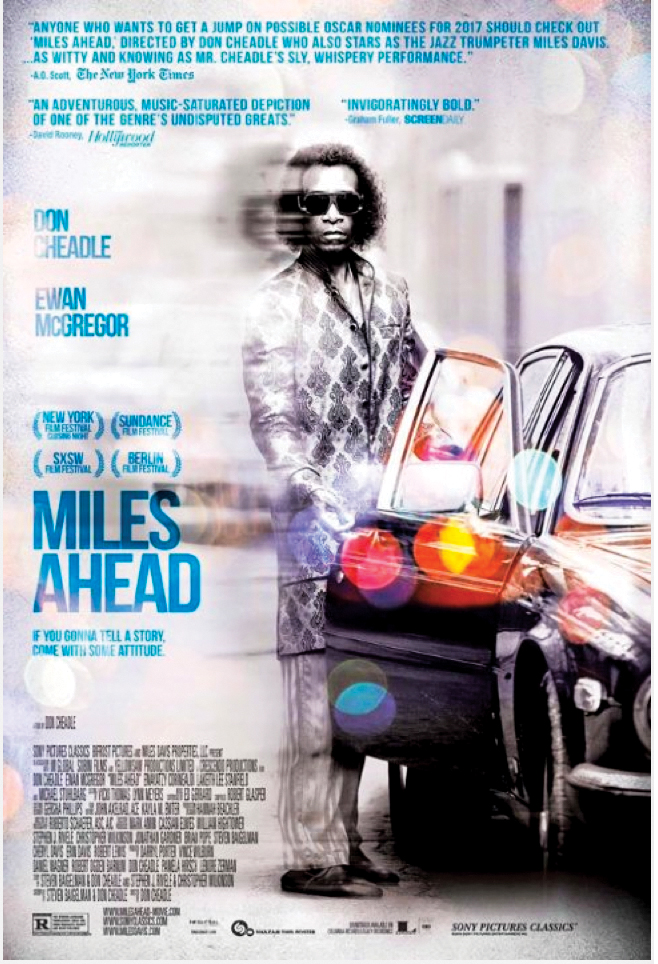 The Sundance Indiegogo films are MeTube 2, an homage to YouTubers who create their own videos; Miles Ahead, a biopic of musician Miles Davis starring Don Cheadle; and Much Ado About Nothing, a study of society’s broken justice system that is based on a true story.
The Sundance Indiegogo films are MeTube 2, an homage to YouTubers who create their own videos; Miles Ahead, a biopic of musician Miles Davis starring Don Cheadle; and Much Ado About Nothing, a study of society’s broken justice system that is based on a true story.
The Slamdance films are Hunky Dory, which explores the relationship between an unconventional father and his son; In Crystal Skin, a documentary about four people who have a rare skin disease; How to Plan an Orgy in a Small Town, a comedy about an awkward situation; The Lesson, a horror film about a tormented teacher and his troubled pupils; Gwilliam, a love story between man and goblin; Neptune, which pairs haunting visions with themes of loss, animism and search for identity; Peanut Gallery, a documentary about a family that never quite recovers from a tragedy; and Fursonas, the story of a tight-knit community of people interested in anthropomorphic animals.
Thanks for reading the Carolina Alumni Review
Carolina Alumni members, sign in to continue reading.
Not yet a member? Become one today.
